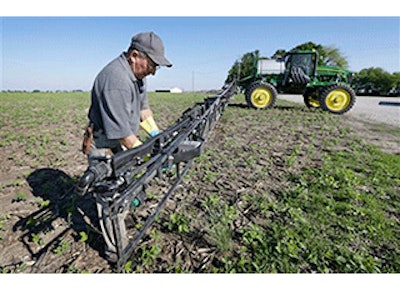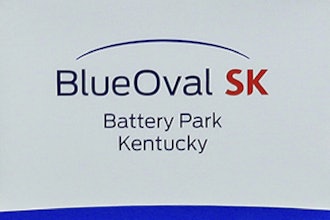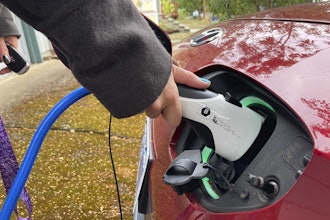
 |
| Ray Gaesser works on a sprayer on his farm, Wednesday, June 11, 2014, near Corning, Iowa. U.S. companies relying on farmers for the raw materials in their products must take a more active role in ensuring the crops are grown in a way that minimizes damage to water, soil, and environment, a new report released Wednesday said. Gaesser, who farms 6,000 acres of corn and soybeans, said most farmers are willing to adopt new measures if they are shown to be beneficial to the land and water and do not reduce productivity. (AP Photo/Charlie Neibergall) |
DES MOINES, Iowa (AP) — U.S. companies relying on farmers for the raw materials in their products must take a more active role in ensuring the crops are grown in a way that minimizes damage to water, soil, and environment, a report released Wednesday said.
Ceres, a nonprofit network of investors, companies and public interest groups, focused in its report on climate change's effect on corn production. It said farmers and the companies they supply must deal with drought and other weather extremes, an increase in groundwater-depleting irrigation, and more fertilizer use.
"Companies that depend on U.S. corn have a big role to play in sending market signals that these issues matter," said Brooke Barton, water program director at Ceres and co-author of the report, which argues that increased corn production has depleted land and water resources in some areas and contributed to increased water pollution from fertilizer runoff.
Food giants working with Ceres include General Mills and Unilever, both of which have adopted sustainability programs suggested by the organization that set specific goals for suppliers and farmers.
The report calls for the establishment of corporate policies for goals to reduce the environmental impact, procurement contracts that require sustainably grown crops, and efforts to identify areas of high water stress, groundwater pollution and overuse of fertilizer.
Ceres also recommends that companies substitute other grains for corn where environmental benefits are well demonstrated, and disclose to investors the company's exposure to climate and water-related risks in its agricultural supply chain.
In Irapuato, Mexico, General Mills provided interest-free loans to farmers to help them invest in drip irrigation equipment to grow Green Giant vegetables, saving more than 1 billion gallons of water a year, the company said.
Corporations are taking on the additional expense to ensure future supplies, but also because of customer demand, said Jerry Lynch, chief sustainability officer for General Mills.
Unilever is working with U.S. soybean farmers on a project to use a newly developed calculator that measures fertilizer use, water quality, energy use, and greenhouse gas emissions.
Unilever has set a goal of 100 percent sustainably sourced commodities by 2020.
Jonathan Atwood, the company's vice president of sustainable living, said the company began at 12 percent in 2010 and achieved 48 percent globally this year.
Coca-Cola announced last year it would buy all of its agricultural ingredients from sustainable sources by 2020, including the corn used for its high-fructose corn syrup.






















